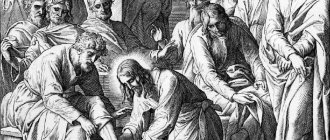Apostle Paul - author of the Epistle to the Corinthians
First Corinthians is one of the most famous and influential texts of the Christian New Testament. This short work had a great influence on theology. It is a rare text devoted to Christianity that does not quote this Epistle. What does 1 Corinthians 13 teach us? It is useful to preface the study of this New Testament text with an acquaintance with the personality of its author - the Apostle Paul (birth name - Saul).
Apostle Paul - author of the Epistle to the Corinthians
Brief Life of the Apostle Paul
The author of Corinthians was born in Asia Minor into the Jewish diaspora at the beginning of our era. It is likely that his ancestors were taken from Israel by the Romans as slaves, but then became free. Saul received a good education at home and in Jerusalem. For a long time he was a zealous Jew who brutally persecuted Christians. Saul was a sincere, truth-hungry believer. However, he was mistaken about Christians, considering them heretics and blasphemers.
One day, when Saul was on his way to fight the followers of Christ in Damascus, he was suddenly blinded by a bright light. A voice rang out:
“Saul, Saul, why are you persecuting Me?” (Acts 9:4).
Saul asked who was speaking to him. The voice answered:
“I am Jesus, whom you persecute” (Acts 9:5).
The Lord commanded the blind and shocked Saul to continue his journey to Damascus. There the future apostle was taught the Christian faith and baptized. During his baptism, his sight returned.
Saul met the apostles Barnabas, Peter, John, James, Luke, and Mark. He began to zealously preach the previously hated teaching of Christ. He made many missionary trips around the Mediterranean. While enlightening the pagans, Saul also used the name “Paul” (small, lesser). With him he entered the history of the Church.
During the reign of the pagan and cruel persecutor of Christians Emperor Nero (60s of the 1st century), the apostles Paul and Peter were arrested and executed in Rome for their preaching among people close to the ruler. Peter was crucified on the cross. Paul could not be executed in this way, since he was a Roman citizen. His head was cut off. The memory of both apostles is celebrated on June 12.
Paul believed in Christ after the Resurrection of the Lord and therefore is not one of the 12 apostles. However, he was called to ministry directly by Christ. Peter and Paul made an invaluable contribution to the spread of Christian teaching. In this regard, they are revered by the Church as the supreme apostles.
13:1,2 This is the third time I'm coming to you. In the mouth of two or three witnesses every word will be established... I write to those who have sinned first and to everyone else, that when I come again, I will not have mercy. Although the testimony of two or three witnesses (Deut. 19:15) does not equate to two or three visits to Corinth by Paul (Paul is only one witness), nevertheless, the Corinthians should understand that this time, after the third warning, Paul will no longer "hang around" » with those who sin in the congregation and will take strict measures against them.13:3 You are looking for evidence of whether Christ speaks in me: In Corinth they were indignant: isn’t Paul taking on too much? How will he prove that it is Christ who guides him, and not he himself who acts at his own discretion?
He is not powerless for you, but strong in you. Let not the Corinthians think that Paul threatens them without having the power to carry out his warnings of severity. If Christ himself speaks through him, then Christ is not weak, moreover, Jesus has already shown his strength among them and will show it yet (the very presence of a meeting of Christians in Corinth already testifies to the action of Christ from above and the power of God with which he has endowed Father)
13:4 For, although He was crucified in weakness, He lives by the power of God; To those in Corinth who doubt the resurrection of Christ (1 Cor. 15:13) - Paul reminds that Jesus was weak only as a man, did not fight in the flesh, and that is why he was crucified. But, having been resurrected with the help of God, he is strong (that is, Paul does not act on his own, but precisely with the help of Christ of God).
and we also, [although] we are weak in Him, yet we will live with Him by the power of God in you. In the same way, Paul, weak from the point of view of the Christians of Corinth, who previously came to Corinth in fear and trembling (1 Cor. 2:3), now, after written repeated warnings, will come to Corinth armed with power from God, which he will show in relation to those whoever they are will be disobedient to the word of God coming from Paul.
13:5 Test yourselves to see if you are in the faith; examine yourselves. The path of complacency and complacency is unacceptable for a Christian. He always and until the end of his days needs to check what path he is on: is it on Christ? And does he go to God? Or is it going in the opposite direction? Analysis of one’s actions, way of thinking and the subject of religion should not stop throughout the life of a Christian.
Or do you not know yourselves that Jesus Christ is in you? Unless you are what you are supposed to be. If the Christians of Corinth are real Christians, and not disguised as them, then they must know the power of Christ
13:6 About us, I hope you will learn that we are what we should be. About Paul, when he comes to them, they will know that he is a true Christian and an apostle, and not masquerading as one, as the false apostles do.
13:7 We pray to God that you do no evil, not to appear to us as what you ought to be; Paul begs them to correct themselves before his arrival, not so that their correction will show Paul’s apostolic authority in a favorable light among Christians (they say, Paul is a skillful teacher if he was able to enlighten them with letters)
but that you do good, even if we seem not to be what we should be. but in order to do this, they must correct themselves so that they themselves can act before God correctly and in a Christian manner, regardless of how Paul or others who call themselves Christians act. We must BE Christians, and not just look like one in front of Paul. In addition, one must BE Christians for YOURSELF and in order to impress God, and not in order to impress one of the people.
13:8 For we are not strong against the truth, but strong for the truth. Paul advocates only for the Christians of Corinth to be righteous before God: if they stand in the truth, then there will be no need for him to take corrective measures against them and prove his apostolic authority.
13:9 We rejoice when we are weak and you are strong; This is what we pray for, for your perfection. Paul does not compete with them and is ready to remain weak and insignificant in their eyes: if only they themselves achieve spiritual maturity and become strong in the faith, this is what Paul prays for Corinth.
13:10 This is why I am writing this in my absence, so that in my presence I would not use severity according to the power given to me by the Lord for creation, and not for destruction. That is why Paul warns them in writing about his authority from Christ to act by his authority to build up and strengthen the congregations, in order to give them the opportunity to prove themselves as spiritually mature and strong Christians in the faith: after all, if they correct themselves, they will show in practice the power of Christ in themselves ( Man himself cannot cope without the help of Christ in the fight against sins)
13:11 However, brethren, rejoice, be perfected, be comforted, be like-minded, peaceful - and the God of love and peace will be with you. Like-mindedness is a sign of maturity in the congregation, if, of course, like-mindedness is in agreement with God.
13:12 Greet each other with a holy kiss. A brotherly kiss. All the saints greet you. The rest of the apostles and companions of Paul.
13:13 The grace of our Lord Jesus Christ, and the love of God the Father, and the fellowship of the Holy Spirit be with you all. Amen. The usual form of wishing the congregation all the spiritual blessings associated with salvation through Christ, with the love of God manifested in the desire to save people through Christ, and also with the positive influence of the holy spirit influencing them through spiritual fellowship with God and His Christ.
First Epistle to the Corinthians
The Apostle Paul is the author of 14 missionary letters (which have come down to us), which set out Christian teaching. These inspired writings were addressed to Christian communities in various territories, as well as to individuals.
Paul wrote several letters to the residents of the Greek city of Corinth. The earliest of those included in the New Testament is usually called the First. Those who are looking for information on the topic “1 Corinthians chapter 13” should know that this work was written by the apostle in ancient Greek in Ephesus (Asia Minor) in the 50s of the 1st century. This was the period of Paul's third apostolic journey. Deacon Pavel Serzhantov notes that the Corinthian community was “problematic” for the apostle:
“Corinth is a large port, a huge bubbling market. Imagine how difficult it is to revive human souls to spiritual life in this market, how difficult it is to build a church, how difficult it is to maintain order in it.”
At that time, the Christian community of Corinth suffered from discord and schism. In Paul's first letter, he calls the inhabitants of the city to reconciliation and unity in Christ. The Apostle denounces enmity, gluttony and prodigal sins. He reminds us that in the community there are repentant pagans, drunkards and debauchees who were able to be cleansed by Christ from their vices.
Also in his Epistle, Paul touches on such topics as the Eucharist, the Resurrection of Christ, apostolic ministry, marriage and celibacy, and food prohibitions. The apostle expresses a desire to visit Corinth again and instructs the inhabitants to help the preachers and other communities.
1 Corinthians Chapter 13: Text
(Synodal translation)
1If I speak in the tongues of men and angels, but do not have love, then I am a ringing brass or a sounding cymbal.
2If I have the gift of prophecy, and know all mysteries, and have all knowledge and all faith, so that I could move mountains, but do not have love, then I am nothing.
3And if I give away all my property and give my body to be burned, but do not have love, it does me no good.
4 Love is patient, it is kind, love does not envy, love does not exalt itself, is not proud, 5 does not act rudely, does not seek its own, is not provoked, does not think evil, 6 does not rejoice in unrighteousness, but rejoices with the truth; 7 He bears all things, believes all things, hopes all things, endures all things.
8 Love never fails, although prophecy will cease, and tongues will be silent, and knowledge will be abolished.
9 For we know in part, and we prophesy in part; 10 But when that which is perfect has come, then that which is in part will cease.
11 When I was a baby, I spoke like a child, thought like a child, reasoned like a child; and when he became a husband, he left behind his children.
12 Now we see as if through a dark glass, fortune-telling, but then face to face; Now I know in part, but then I will know, even as I am known.
13And now these three remain: faith, hope, love; but love is the greatest of them all.
Chapter Thirteen
Not a simple prophecy, but the highest, and knowing all the secrets. Note: about tongues he said that they are of no use, but about prophecy that it knows all mysteries and all understanding.
He did not say: if I die, but he represents the most cruel thing of all, that is, burning alive, and says that this is useless without love. Another will say: how can you give away property without love? This can be answered in two ways. Or: the apostle assumed the impossible to be possible, just as in the words: “even if we, or an angel from heaven, preached to you a gospel other than what we preached” (Gal. 1:8–9); for neither he himself nor the angel thought to preach otherwise. This is how it is expressed in many other places (Rom. 8:39). Or: you can give without love, namely, when it happens not out of compassion for those in need, but out of people-pleasing. This happens with love when someone does it out of sympathy and ardent love.
Another may be long-suffering, but envious. But love avoided this too. He said this about those who were envious among the Corinthians.
That is, love does not act foolishly, but makes the one who has it prudent and firm. A dreamy, frivolous, stupid person is exalted. This is said about the frivolous and superficial.
You can have all the above virtues, but be proud of them. But love does not have this, but even with the mentioned virtues of humility. This is against the arrogant.
That is, love not only is not proud, but even if it experiences extreme distress for its beloved, it will not consider this shameful and inglorious for itself, just as Christ, out of love for us, not only endured the dishonorable crucifixion, but also attributed it to glory For yourself. You can understand it this way: it does not behave outrageously, that is, it does not offend; for there is nothing more shameful than an offender. This is against those who are not condescending to others.
But, he says, what is much more important, he rejoices with those who are in a good opinion, and counts it as glory to himself when the truth succeeds. This is against the envious.
Whatever her beloved says; for she herself does not say anything feignedly, and does not think that another would say so.
That is, he never deviates from the goal, but brings everything to fruition; or, which is better, it is not interrupted, not stopped, never ceases, but continues in the next century, when everything else will be abolished, as the apostle will further say.
Having listed the creations of love, he again exalts it in a different way, namely, he says that both prophecy and tongues will end, and love will remain constantly and indefinitely. For if prophecies and tongues exist so that faith can be more conveniently accepted, then, as faith spreads everywhere, naturally they will cease, as unnecessary, in the present century, and especially in the future.
This corresponds to languages.
This is in accordance with the prophecies.
This corresponds to knowledge.
That is, in the next century I will have more mature knowledge; then the small and infantile knowledge that we have here will be abolished. Then he continues.
He says this not because God has a face, but in order to show through this the clarity and visibility of knowledge.
Doubly humiliates their pride, showing that current knowledge is incomplete, and that it is not our own. It was not I, he says, who knew God, but He Himself knew me. Therefore, just as now He Himself knew me and He Himself condescended to me, so I will reach Him then much more than now. Just as someone sitting in darkness, until he sees the sun, does not himself strive for its beautiful ray, but the ray shows itself to him with its radiance, and when he receives the radiance of the sun, then he himself strives for the light. So, the words “just as I am known” do not mean that we know Him as He knows us, but that just as He has condescended to us now, so we will reach Him then. Similarity: someone found an abandoned child, noble, plausible; for his part, he recognized it, raised it and took it to himself, took care of it, raised it nobly, finally, endowed it with wealth and brought it into the royal chambers. A child, while he is young, does not feel any of this, and is not aware of the philanthropy of the face that raised him. But when it matures, it immediately recognizes its benefactor and loves him worthily. Here is an example to explain what is hiddenly expressed in what was said.



